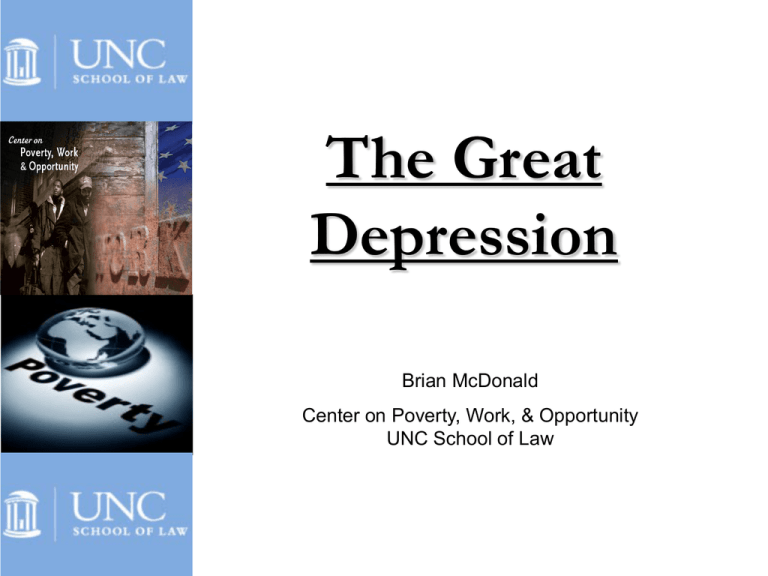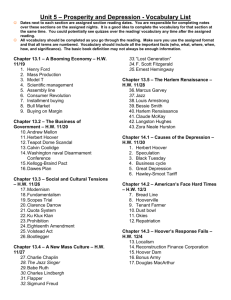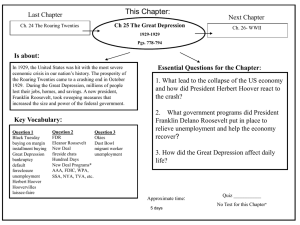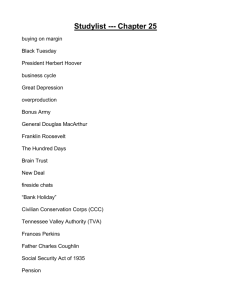The Great Depression Brian McDonald Center on Poverty, Work, & Opportunity
advertisement

The Great Depression Brian McDonald Center on Poverty, Work, & Opportunity UNC School of Law Trends of the 1920s • Economic prosperity for much of the country • Improvements and setbacks for both women and minorities • Significant technological changes in society • Republican domination of the American Presidency • Laissez-faire approach from the federal government America in the 1920s Election of 1928 Herbert Hoover (Red) – Republican Alfred Smith (Blue) - Democrat Wall Street Crash • October 24th, 1929: Black Thursday – The market lost 11% of its value (many investors decided to sell) – Major bankers/investors pumped money in to prevent a larger drop and try to stop the fall • October 29th, 1929: Black Tuesday – Market lost an additional 12%; many investors sold, economic depression Herbert Hoover • Much debate exists as to Hoover’s effectiveness when the market crashed • In lieu of federal involvement, he left much of the decision-making to the states (laissezfaire) • Hoover blamed for economic problems of the country – Homeless communities emerge; media calls them “Hoovervilles” Causes of the Great Depression • Stock Market Crash buying on the margin and stock speculation • Continued crop failure in the dust bowl • Rest of the world (global economic issues) • Excessive goods (overproduction) • Weak farm economy (and agricultural issues) • Excessive use of credit • Direction of government and monetary policies Photographic Essay Photographic Essay Photographic Essay Photographic Essay Photographic Essay Photographic Essay Election of 1932 Franklin D. Roosevelt (Democrat) - Blue Herbert Hoover (Republican) - Red Franklin Roosevelt After Roosevelt overwhelmingly wins the election, he tells the nation: “I pledge you, I pledge myself, to a new deal for the American people.” The resulting New Deal is his comprehensive set of programs to put people back to work motivating relief, recovery, and reform for the country. Significant New Deal Programs • Civilian Conservation Corp • Public Works Administration • Securities & Exchange Commission • Tennessee Valley Authority • Agricultural Adjustment Administration • National Labor Relations Act • Social Security Act • Emergency Banking Act • Civil Works Administration • Federal Deposit Insurance Corporation • Reconstruction Finance Corp New Deal Programs Public Works Administration Project (Mississippi River) Civilian Conservation Corp Construction Consequences of the Great Depression • Job loss, increased unemployment (25% in 1932); recession from 1937-39 • Homelessness and increases in economic inequality; limited resources • Culture of poverty (including psychological problems and substance abuse) Questions 1. 2. 3. What were the strengths and weaknesses of Hoover and Roosevelt’s responses to the Great Depression? How successful was the New Deal? Did that, or World War II, get the nation out of the Great Depression? What role should the federal government play in the economic success of our country?


